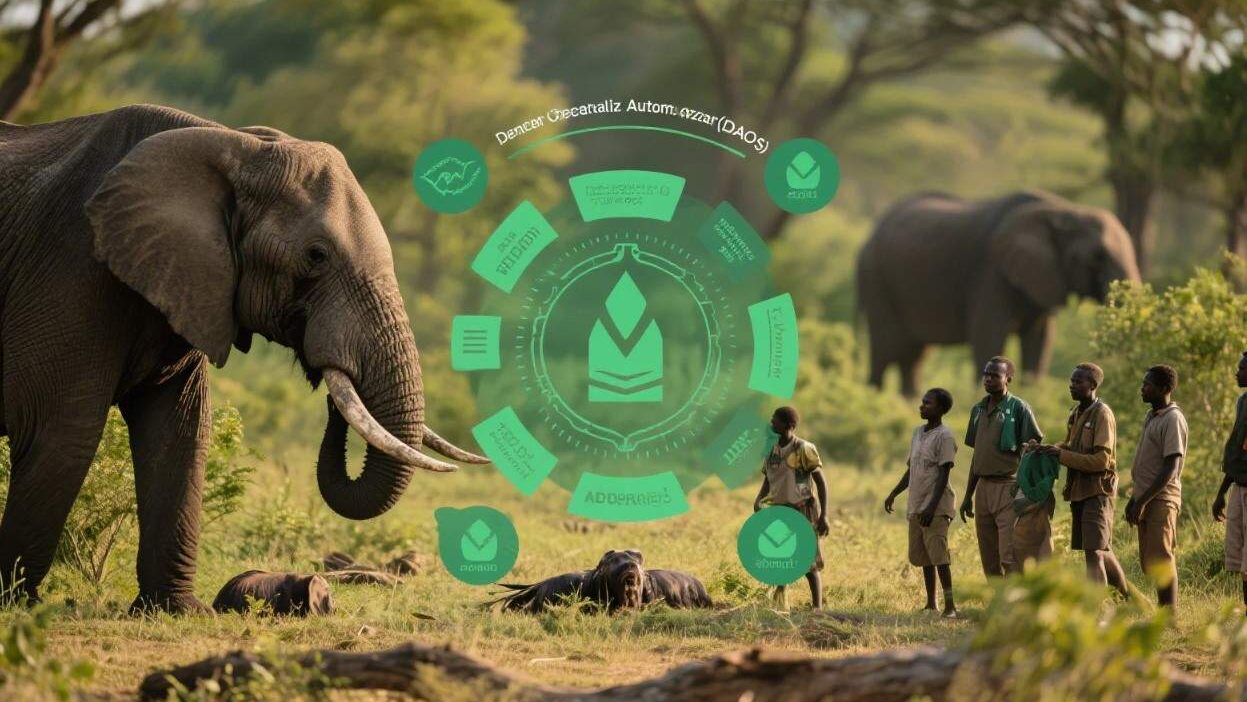Rethinking Conservation with Decentralized Tech
Wildlife conservation faces urgent challenges: habitat destruction, poaching, and climate change. Traditional models—reliant on governments, NGOs, or private donors—often struggle with inefficiency, lack of transparency, or limited community input. Enter Decentralized Autonomous Organizations (DAOs): blockchain-based entities governed by smart contracts, enabling decentralized, community-driven decision-making. By merging blockchain’s transparency with collective ownership, DAOs are redefining how we protect biodiversity.
What Are DAOs?
DAOs are self-governing organizations run by rules encoded in smart contracts (self-executing code on a blockchain). Key features:
- Decentralization: No single authority controls decisions; governance is distributed among token holders.
- Transparency: All transactions and votes are recorded on the blockchain, visible to all participants.
- Automation: Smart contracts enforce rules (e.g., distributing funds, approving projects) without human intermediaries.
DAOs in Wildlife Conservation: Key Applications
1. Crowdsourced Funding for Conservation
DAOs enable global communities to pool resources for projects like reforestation, anti-poaching tech, or habitat restoration. For example:
- A “Wildlife Conservation DAO” could issue tokens (e.g., “EcoCoins”) representing shares in a fund. Investors buy tokens, and profits from eco-tourism or carbon credits flow back to the DAO, funding new initiatives.
- Projects are voted on by token holders, ensuring alignment with community priorities (e.g., protecting a local endangered species over a distant rainforest).
2. Community-Led Conservation
Indigenous and local communities, often marginalized in traditional conservation, gain ownership via DAOs. For instance:
- A DAO could grant land rights to a tribe, with governance rules ensuring sustainable use (e.g., banning logging but allowing eco-friendly tourism).
- Votes on resource allocation (e.g., hiring rangers, buying camera traps) are decided by community members, fostering ownership and compliance.
3. Anti-Poaching and Enforcement
DAOs can incentivize conservation through real-time rewards. Examples:
- A “Poaching Alert DAO” uses AI to detect illegal activity (via camera traps or satellite data). Token holders vote to reward rangers or locals who report poaching, creating a community-driven enforcement network.
- Funds from fines (e.g., seized ivory sales) are automatically distributed to conservation projects via smart contracts, eliminating corruption risks.
Benefits of DAOs for Conservation
- Transparency: Blockchain ensures every dollar and vote is traceable, reducing fraud.
- Inclusivity: Local communities, not just NGOs or governments, have a direct say in conservation priorities.
- Sustainability: Token economies align incentives—investors profit from healthy ecosystems, encouraging long-term commitment.
Challenges and Risks
- Regulatory Uncertainty: Many governments don’t recognize DAOs as legal entities, complicating fundraising or land ownership.
- Technical Vulnerabilities: Smart contracts can be hacked, risking fund theft or project mismanagement.
- Inequitable Participation: Wealthier token holders may dominate voting, sidelining marginalized communities.
Ethical Considerations
- Equity: Ensure marginalized groups (indigenous peoples, women) have equal voting power and access to benefits.
- Accountability: DAOs must balance decentralization with oversight to prevent misuse (e.g., token speculation overriding conservation goals).
The Future: DAOs as Conservation Catalysts
Next-gen DAOs could integrate AI for predictive analytics (e.g., identifying at-risk habitats) or NFTs to represent conservation milestones (e.g., “1,000 trees planted” tokens). Partnerships with governments (e.g., using DAOs to manage protected areas) and NGOs (e.g., funding research) will amplify impact.
A Decentralized Path to Biodiversity
DAOs offer a revolutionary way to fund, govern, and protect wildlife—democratizing conservation and empowering communities. By leveraging blockchain’s trust and transparency, they turn passive donors into active stewards. As technology evolves, DAOs could transform how we safeguard the planet’s biodiversity, proving that collective action, not just charity, drives lasting change.



